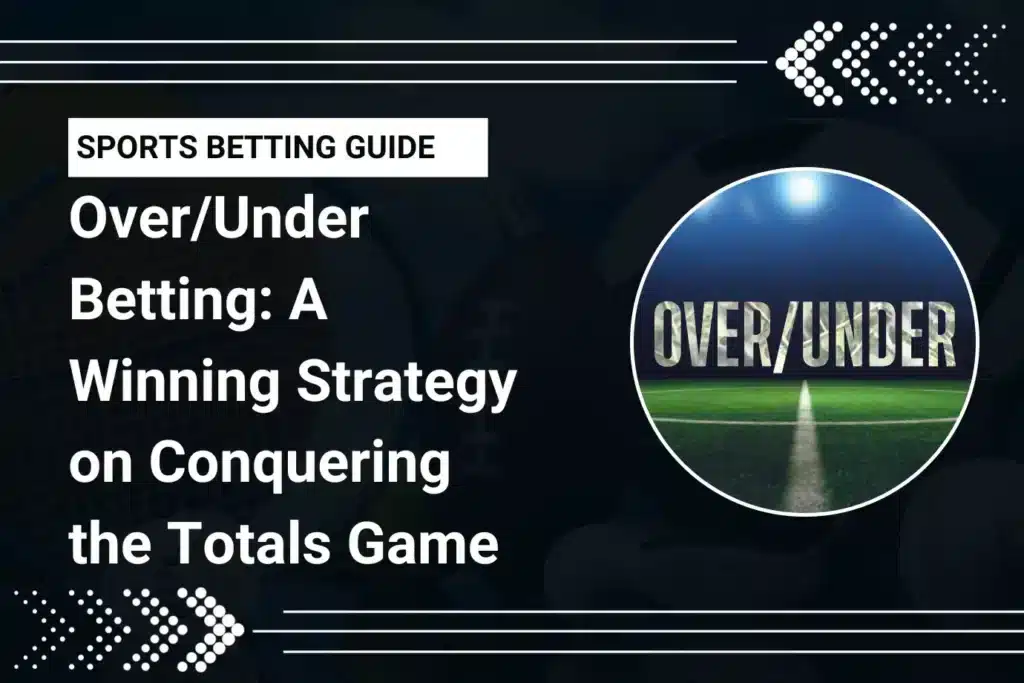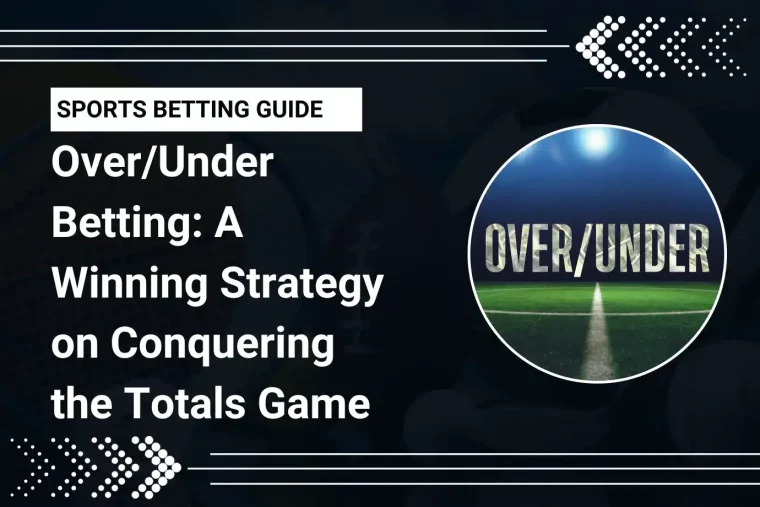
Over/under betting or totals betting is a prevalent form of wagering in various sports. In difference to point spread or handicap betting, where the focus is on the performance of individual teams, over/under betting revolves around the combined score of both teams.
This type of betting involves predicting whether the total score of a game will be over or under a specified number set by oddsmakers. Rather than determining a favorite or underdog, over/under betting challenges bettors to assess both teams’ offensive and defensive capabilities. The oddsmakers establish a benchmark total score, and bettors decide whether the game’s combined score will surpass (over) or fall short (under) of that predetermined figure.
How Does Over/Under Betting Work?
Over/under betting, also known as totals betting, involves predicting whether the combined score of a game match will be over or under a predetermined number set by oddsmakers. This type of wagering adds an intriguing element to sports betting by focusing on the overall scoring dynamics rather than the specific outcome for a particular team.

Let’s explore an upcoming matchup between the Golden State Warriors and the L.A. Clippers, with the oddsmakers setting the Over/Under totals at 114.5 for the Golden State Warriors and 112.5 for the L.A. Clippers.
If you choose to bet on the Golden State Warriors Over 114.5, they need to score 115 points or more for your bet to win.
Conversely, if you opt for the Under 114.5, you’re hoping for a total combined score of 114 points or less for the Golden State Warriors.
Similarly, for the L.A. Clippers, if you bet on the Over 112.5, you’re anticipating a combined score of 113 points or more for the Clippers. On the other hand, choosing the Under 112.5 means you’re banking on a combined score of 112 points or less for the L.A. Clippers.
To illustrate, let’s say the game’s final score is Golden State Warriors 118 – L.A. Clippers 110. The combined score is 228 points, surpassing both Over totals. Consequently, bets on the Golden State Warriors Over 114.5 and the L.A. Clippers Over 112.5 would be winning bets, providing an exciting outcome for those who predicted a high-scoring game. Over/under betting brings an additional layer of anticipation to sports betting, emphasizing the overall performance of both teams rather than focusing solely on their outcomes.
How Odds Work on Over/Under Betting
Odds in over/under betting are typically displayed in one of 3 formats: American odds, decimal odds, or fractional odds.
American odds: Expressed as either positive or negative numbers. Positive odds (represented by a “+” sign) indicate the profit you would win for every ₱100 you bet. For example, +110 means you would win ₱110 for every ₱100 you bet. Negative odds (represented by a “-” sign) indicate the amount you must bet to win ₱100. For instance, -110 means you must bet ₱110 to win ₱100.Decimal odds: Represented by numbers greater than 1. These odds represent the total payout (including your initial stake) for every ₱100 you bet. For example, 2.10 means you would win ₱210 for every ₱100 you bet.Fractional odds: Expressed as a fraction, indicating the potential profit compared to the stake. For instance, 2/1 means you would win ₱200 for every ₱100 you bet.
Interpreting the Odds
Let’s consider an example of an over/under bet between Team A and Team B for a football game. The oddsmakers set the total for the game at 45 points. It means that if you bet on the over, you win if the combined score of both teams is 46 points or more. If you wager on the under, you win if the combined score is 44 points or less.
The odds for the over and under might be displayed as follows:
Over 45 points: -110Under 45 points: +110
If you bet ₱110 on the over and the combined score is 46 points or more, you would win ₱100 (your initial stake) plus ₱110 (profit), for a total payout of ₱210. If you bet ₱110 on the under and the combined score is 44 points or less, you would win ₱110 (your initial stake) plus ₱100 (profit), for a total payout of ₱210.

Sports Where Over/Under Betting is Common
Over/under betting, also known as totals betting, is a popular type of sports betting market where you wager on whether the combined score of a game will be greater or less than a predetermined number. This type of bet is particularly common in sports with high-scoring tendencies, allowing bettors to analyze offensive and defensive strengths and make informed predictions about the total points or goals scored.
Here are some of the sports where over/under betting is prevalent:
American Football (NFL, NCAA, FBS): American football games typically involve many points, making over/under bets particularly engaging. Bettors can analyze factors like team offenses, defensive efficiency, weather conditions, and historical trends to assess the likelihood of a high-scoring or low-scoring game.Basketball (PBA, MPBL, NBA, NCAA): Basketball is another fast-paced, high-scoring sport where over/under bets are widely offered. Bettors can consider factors like team shooting percentages, defensive strategies, and the presence of offensive superstars when making their predictions.Baseball (MLB): While baseball is generally considered a lower-scoring sport than football and basketball, over/under bets still hold significant appeal. When making their picks, bettors can evaluate pitcher matchups, park factors (hitter-friendly or pitcher-friendly stadiums), and team offensive production.Ice Hockey (NHL): Ice Hockey games often exhibit a back-and-forth flow, leading to over/under bets being popular among hockey enthusiasts. When making predictions, bettors can analyze team scoring rates, power-play efficiency, and goaltending performances.Football (English Premier League, La Liga, Serie A): Despite being known for its lower-scoring nature, it offers interesting over/under betting opportunities. When making their picks, bettors can evaluate team attacking styles, defensive stability, and head-to-head records.
In addition to these primary sports, over/under betting is available for various other sports, including cricket, tennis, golf, volleyball, and boxing. The popularity of over/under betting varies depending on the sport, league, and individual preferences.
Best Over/Under Betting Tips and Strategies
While understanding the basics of over/under betting, or totals betting, is important, truly mastering this betting strategy requires implementing these best tips and strategies to unlock its full potential.
Analyze recent trends: Consider both teams involved in the matchup scoring trends. If both teams have been averaging high scores in their recent games, the over may be a good bet. Consider weather conditions: Weather conditions can significantly change scoring in certain sports, particularly outdoor sports like football and baseball.Check injury reports: Injuries to key players can majorly impact a team’s offense or defense. If a team is missing a star player, they may be less likely to score points, which could favor the under.Consider situational factors: Situational factors can also affect the scoring in a game. For example, if a team is playing for a championship or to avoid relegation, they may be more likely to take risks and score points.Seek expert opinions: Many experts provide over/under betting tips. While you should be okay with their advice, it can be helpful to consider their insights as part of your analysis.Shop for the best odds: Online betting sites may offer different odds for the same over/under line. Shop around to find the sportsbook that offers the best odds for your wager.Manage your bankroll: Over/under betting can be a fun and profitable way to bet on sports, but managing your bankroll responsibly is important.
Remember, over/under betting or totals betting is a form of gambling, and there is no guarantee of winning. Always play responsibly and never chase your losses.


